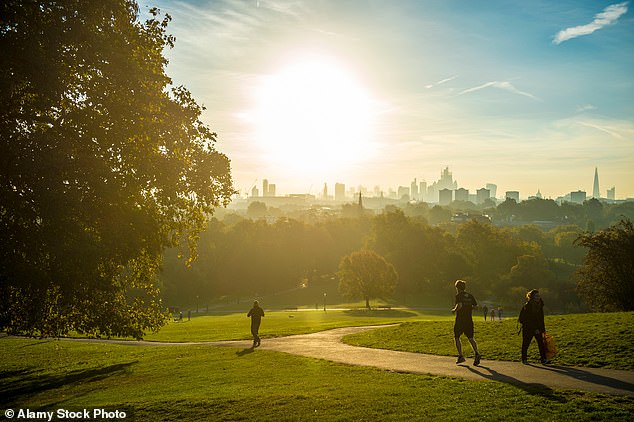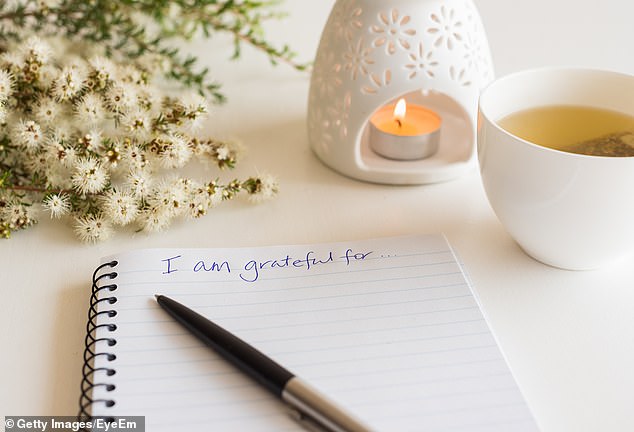As the much-missed Dr. Michael Mosley makes his final TV appearance, here are some simple, science-based tips from his bestseller Just One Thing that can improve your life
“So, do you want to take my Just One Thing challenge?” asks Dr. Michael Mosley with sparkling eyes in the first episode of a new TV series, filmed by the Mail columnist.
Tragically, only two episodes were completed before his untimely and shocking death at the age of 67 while walking on a Greek island in the summer. But as he returns to our screens for the final time, this infectious call to action lives on.
Here, in the final part of our series celebrating the best of his advice, you’ll find Dr. Mosley’s guide to making Just One Thing part of your daily routine, starting with the tweaks that will make lunch more life-enhancing.
LUNCHTIME LIFESAVERS
Finish your meal with an apple
I love the taste of an apple and I find it brightens the taste. So I’m thrilled that there is a lot of truth in the old saying that “an apple a day keeps the doctor away,” wrote Dr. Michael Mosley.
WHEN I have lunch, whether it’s oily fish or a sandwich on the go, I like to end it with an apple.
I like the taste and I find it brightens the taste. So I’m very glad that there is a lot of truth in the old saying that ‘an apple a day keeps the doctor away’.
Dr. Catherine Bondonno, a nutritionist at the Nutrition & Health Innovation Research Institute at Australia’s Edith Cowan University, told me that apples are not only high in fiber, but also rich in beneficial compounds called flavonoids.
‘Flavonoids are produced by plants to protect them from sunlight and disease and are thought to have a similar protective effect in humans when we eat them,’ explains Dr Bondonno.
‘Research has shown that flavonoids from fruit can increase the production of a molecule in our bodies called nitric oxide, which regulates blood pressure and maintains blood vessel health.’
Most of an apple’s flavonoids are in or just under the skin, so you should eat your apples unpeeled.
Dr. Bondonno says that in addition to reducing inflammation and improving blood pressure, apples have been shown to lower cholesterol and reduce the risk of diabetes.
As for which varieties are best, Dr. Bondonno that those with the highest concentration of flavonoids are Pink Ladies.
Take a nap right after lunch

Take a nap right after lunch, wrote Dr. Michael Mosley in his book Just One Thing
If you’re a bad sleeper and often suffer from a mid-afternoon slump, why not take advantage of this dip in energy to get some shut-eye instead of grabbing a cup of tea or coffee?
Recent research suggests that a nap can do great things for your mind and body. Not only does it improve mood and well-being, but large studies have even shown a link between regular napping and good heart health.
One study found that an occasional daytime nap was associated with a 48 percent lower risk of heart attack, stroke or heart failure.
An afternoon nap can also improve your thinking skills.
Dr. Sarah Mednick, a cognitive neuroscientist and sleep researcher at the University of California, is a big fan: “Our research shows that a good nap can provide the same benefits as a full night’s sleep,” she says.
‘A twenty-minute nap is a useful way to hit the reset button, increasing our alertness and attention and sharpening motor skills.’ The downside to a longer nap – anything longer than 30 minutes – is that it may be harder for you to fall asleep in the evening.
And try to take it in the early afternoon, shortly after lunch, no later than 3 p.m.
AFTERNOON PICK-ME-UPS
Get off your butt

Image of people waking up and running in the park: Spending more time standing is good for your blood sugars and for your bones
If you work at a desk, you will have spent a lot of time sitting by the end of the afternoon, which is bad for your body.
Fortunately, there is a simple solution: get up!
Not just every afternoon, but at least a few minutes every hour. Spending more time standing is good for your blood sugar levels and for your bones.
John Buckley, professor of applied exercise science at the University Centre, Shrewsbury, told me that when we sit for long periods of time our bodies go into sleep mode, switching off many of the important functions that keep us healthy.
“As hunter-gatherers, we are designed to be on the move most of the day,” he says. “Sitting slows down our metabolism and brings everything down to a resting level.” You might be hoping that you can offset the harm of spending all day on your butt with a sweaty trip to the gym after work. But emerging evidence suggests that unless you do 40 minutes of moderately vigorous exercise every day, you can’t reverse the damage that sitting does.
And even worse, if you sit for long periods of time every day, you can reduce the benefits of any exercise you do.
The answer lies in taking the opportunity to stand whenever you can during the day.
EVENING BOOSTERS
Learn something new

Taking the time to learn something new is part of Dr. Mosley’s guide to making Just One Thing part of your daily routine
Instead of parking yourself in front of the TV every night, take the time to learn something new. Acquiring skills later in life will not only give your brain a good workout, but can even mean creating new brain cells.
Learning can also reduce stress levels.
In one study, volunteers were asked to learn something new or do something relaxing.
Perhaps surprisingly, it was the group that learned new skills that saw the greatest reduction in stress.
That’s because when you do something that consumes you, the outside world is put on hold.
Like practicing mindfulness, it calms the critical voice in your head that so often makes you focus on past failures and get you down.
If the skill is challenging enough, your brain will be forced to take new paths and make new connections, and this can increase your brain power.
Research shows that after three months of working on a new skill, people show improvements specifically in the areas of the brain most affected by the aging process.
One of the best things for your brain is learning a new language, because juggling between different sounds, words, concepts, and grammatical and social rules improves blood flow and connections throughout the brain.
It can physically change your brain, increasing the number of brain cells and the connections between them.
It can even improve your intelligence. But for maximum benefit, commit to the task and practice your new language five hours a week!

Studies suggest that regular hot baths can help lower blood sugar levels and lower the risk of heart disease
Enjoy a warm bath before going to sleep
A wonderfully relaxing hot bath is one of those rare pleasures in life that not only feels wonderful, but is also good for you!
Studies suggest that regular hot baths can help lower blood sugar levels and lower the risk of heart disease.
And anyone who has trouble falling asleep at night would like to know that a warm bath, 90 minutes before bedtime, can help them fall asleep faster and improve sleep quality.
This is due to the effect on the core temperature of the body. But you have to get the timing right.
When you take a warm bath, your body temperature rises. But it’s only when you get out and start to cool down that you get the sleep-inducing benefits.
‘When your core temperature drops, this mimics the onset of sleep, releasing the sleep hormone melatonin and sending a powerful signal that it’s time for bed,’ says Jason Ellis, professor of psychology at Northumbria University and director of Northumbria University. Center for Sleep Research.
“A dip in the bath is also valuable ‘me’ time after a busy day,” he adds.
For maximum beneficial effect, aim for a temperature of 40 to 42 degrees Celsius, about 90 minutes before bedtime.
Keep a gratitude journal

There’s solid science that developing the habit of regular gratitude can make you feel happier, lower your blood pressure, improve sleep, relieve pain, and even rewire your brain.
Finally, in the evening, write down three things for which you are grateful.
There’s solid science that developing the habit of regular gratitude can make you feel happier, lower your blood pressure, improve sleep, relieve pain, and even rewire your brain.
“Gratitude opens your perspective, allowing you to appreciate the positive instead of focusing on your worries,” recommends Fuschia Sirois, a professor of psychology who specializes in research on gratitude and its role in health.
“It reduces stress by helping us see things from the narrow perspective we adopt when our fight-and-flight mechanisms are activated.”
In her studies, patients with chronic health problems who counted their blessings for three weeks reported significantly less pain and better sleep than those in a control group.
l Adapted from Just One Thing by Dr. Michael Mosley (short books, £9.99). To order a copy for £8.99 (offer valid until 26 October 2024; UK P&P free on orders over £25) visit www.mailshop.co.uk/books or call 020 3176 2937. Michael Mosley : Just One Thing airs tomorrow at 8.30pm on BBC1.
